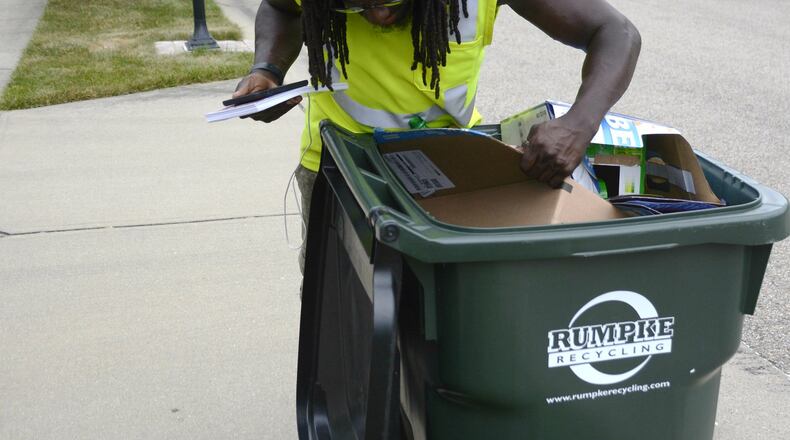In both communities, the recycling rate did not drop, staying “pretty level” at around 50 percent, said Rumpke spokeswoman Molly Yeager Broadwater.
FAIRFIELD NEWS: How Fairfield has helped improve the world’s water quality for 25 years
“Recycling contamination has a huge cost to our business. It’s also preventing the correct items from being recycled, and that’s the bigger problem,” Broadwater said.
“Some of the right items might not be recovered, and we want to make sure everyone’s recycling efforts count. We’re making sure the items you took the time to separate out end up in the right spot … so they can become these new and useful items.”
Inappropriate recycling costs Rumpke roughly $1.5 million annually, which includes stopping the recycling sorting process and hauling the non-recyclables to the landfill, she said.
Rumpke sees between 13 and 18 percent contamination in its recycling pickups, and the goal is to drop that to at most 5 percent, Broadwater said.
On May 20, Rumpke conducted a one-ton audit of recycling materials from 15 samples in each community. In July and August, trash haulers went around Fairfield and Centerville to physically check every recycling bin and cart. Recycling was left behind if it had too much contaminated material with a tag saying what’s allowed, though Fairfield recyclers were given a one-week reprieve when the program started.
About half of Fairfield’s recyclers had a corrective tag, which either said “good try” or “oops” for having too much materials.
Plastic bags, the kind you’d find at grocery and convenience stores, was “a big target of the campaign,” Broadwater said.
“There were still some plastic bags in the audited load at the end (in Fairfield), but we saw a decrease in the amount,” she said. “And fewer people were bagging the materials, as well.”
The recycling audit in Fairfield was done in concert with the city of Fairfield and Butler County Solid Waste District. County waste district coordinator Anne Fieher Flaig said the results prove that direct-to-consumer communication “really has an impact on behavior.”
But Fieher Flaig is interested in evaluating the “long-lasting behavior change” has been gained with this audit and has asked Rumpke to conduct a sample audit in six to 12 months.
“I think part of truly identifying and truly analyzing behavior change is looking at a longer window, as well,” she said. “This is the first time we ever embarked on a project like this, and clearly we hope the results stick and last.”
Fairfield City Manager Mark Wendling said Rumpke’s program fits with other environmental efforts in the city, including Environmental Commission, Tree City USA status and urban forestry program.
“ It’s great that the program did have some success in educating people about what to put in the recycling tote and what not to put in,” he said. “Hopefully long-term that sticks, but we have to wait and see.”
In Centerville, there were no plastic bags in the audited ton of material, she said.
“They really took that message home in Centerville,” Broadwater said.
Rumpke is now starting a 10-week audit in the city of Cincinnati, which recycles every other week.
“And if it continues working, we’re just continuing trying it to see if we’re able to cut down on contamination,” she said.
Cincinnati’s contaminated recycling was at 29 percent, but could rise because the pre-audit samples were collected during the “monsoon season” where there were a lot of wet newspapers and caused materials to weigh more. Broadwater said the percentage could increase depending on a consultant’s recommendation.
The Dos and Don’ts of recycling
Rumpke will take in recycling bins and carts:
• Paper products, like cereal boxes, cardboard and phone books
• Plastic bottles, including emptied drink, shampoo and detergent bottles
• Metal cans, but only non-hazardous and non-flammable materials, like soda cans or canned soups, fruits and vegetables
• Cartons, like emptied juice boxes, orange juice and milk cartons.
Rumpke does not want with recycling bins and carts:
• Plastic bags (grocery stores do take used plastic shopping bags)
• Yard waste and debris• Any hazardous materials
• Clothing
• Batteries (Click here to find local retailers that takes batteries)
• Pots and pans
• Needles (Rumpke asks people place sharp objects, like needles, in a plastic container, seal lid with tape and write “sharps” on the container. Then dispose of the container in the regular trash)
Source: Rumpke
About the Author

